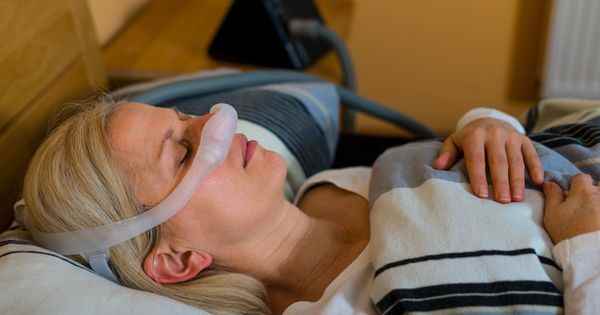Published ,
Reading 4 mins.
Philips ventilation devices useful in the treatment of sleep apnea are accused by some patients of being “possibly the cause of cancer”. Asked about the question, Dr. Liath Guetta, pulmonologist, wants to be right.
Matthew explains on the antenna of RMC that he is being treated for sleep apnea and has been diagnosed with cancer, lymphoma, lymph node tumor. A few days after the diagnosis, he discovers a press release from Philips, explaining that his continuous positive airway pressure (CPAP) device is potentially defective. “I learned by accident that there was a recall campaign for my device and I have not received any letters or communication from Phlips. I would like to know why I was not contacted, and of course I would like to know if the machine is the cause of my cancer”. Together with other patients, they create a Facebook pageto echo their story.
No announcement, recall or exchange of defective machines
The manufacturer announces that it is recalling 5 million machines, including 370,000 in France. But nearly 8 months after this announcement, Philips has only recovered 25,000 devices in France, just over 6%. The vast majority of users still have their device, and most would be unaware of the risk they run.
According to Mathieu, no one recalls his machine or makes any exchange: neither his doctor, nor Philips, nor his service provider… for lack of being able to provide another.
Sound deadening foam design issue
It was in July 2021 that the Dutch electronics giant Philips announced in a statement a design problem in its devices intended to combat sleep apnea. The sound-absorbing foam of these devices would be likely to release chemical particles as it degrades, resulting in “headaches, irritation and toxicity with carcinogenic effects“.
Mathieu sees there the reason for his cancer, but for the pulmonologist Liath Guetta, we must keep reason. “There is only one declared case at the moment, we are not on a class action. In addition, the device simply pushes ambient air. I don’t see a priori a link with lymphoma. Ventilation has never caused cancer” explains the pulmonologist, expert of the medical committee of Doctissimo.
Two ongoing ANSM investigations
However, the question deserves to be explored. The president of Airas, an association for people with respiratory problems, Christian Trouchot explains: “We have been on a real step forward since last year, because the Medicines Health Agency (ANSM) will ask Philips for two specific surveys, relating to medical results, in particular. Everyone has realized that it is the health of individuals that is in question”.
The president of Airas is also awaiting the medical conclusions of Philips relating to the “inhalation of these particles and their consequences on health”.
“Patients must continue to follow their treatments”
In the meantime, it is important for all patients to continue using their machines, as Dr. Guetta reminds: “It is essential that doctors reassure their patients and that they continue to follow their treatments, because they unfortunately have no alternative.”. It is also the recommendation of the health authorities, including the ANSM, which insists on the fact “that while waiting for the replacement of the equipment, the treatment must not be interrupted“. The ANSM thus declares:
- We recommend, in consultation with health professionals, not to stop your treatment, regardless of the type of device used.
- Your pulmonologist or home healthcare provider has contacted you or will contact you to arrange for the repair or replacement of your equipment, depending on the availability of equipment.
- In case of headache, irritation (skin, eyes, respiratory tract), inflammatory reactions, cough, chest pressure, asthma and sinus infection, or other symptoms that may be related to the use of the device , contact your doctor.
- In the event of such side effects, we also invite you to make a report on the reporting portal, specifying the complete serial number of the device (your doctor can help you make this report).
What is sleep apnea?
Sleep apnea concerns 5 to 7% of French people, but only 15% of them would be diagnosed. These are intermittent absences of breath during sleep, due to the relaxation of the muscles that control the tongue and the soft palate to keep the upper airways open. They can occur 30 to 500 times a night and last 60 to 90 seconds. They lead to a reduction in the quantity of oxygen available in the blood and cause numerous micro-awakenings which strongly affect the quality of sleep with, in the long term, cardiovascular and cerebrovascular risks.
Signs of sleep apnea
Often, the spouse is alerted by the snoring and respiratory arrest during sleep. Other signs can also alert: falling asleep during the day, feeling constantly tired, being depressed or irritable…
Sleep apnea treatment
The most common treatment is continuous positive airway pressure (CPAP). It consists in wearing, during sleep, a nasal mask connected to a device that blows air under pressure, in order to open the airways. There are also mandibular advancement orthoses that allow the jaw to be moved forward and the pharynx to be freed to allow air to pass. These devices are less restrictive, but less effective. In case of failure of these treatments and if there are anatomical anomalies of the ENT or maxillofacial sphere, an operation can also be considered.
